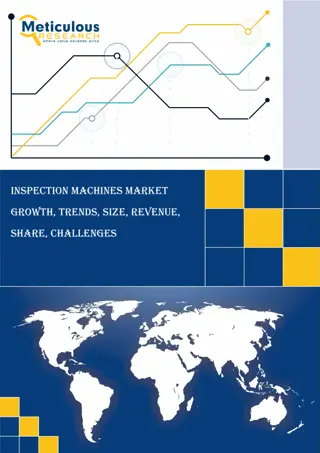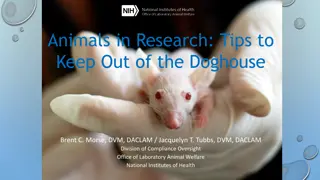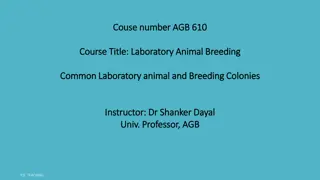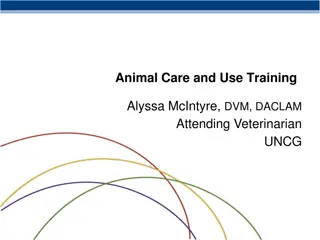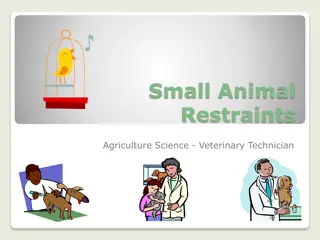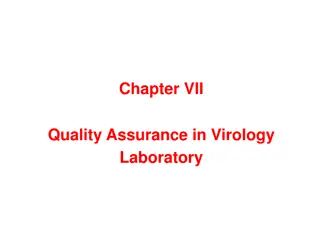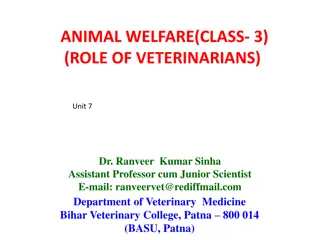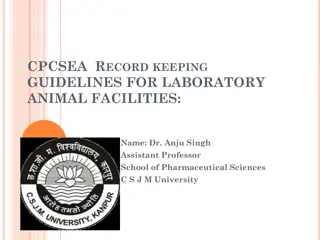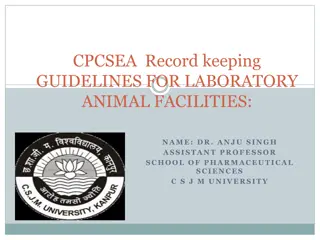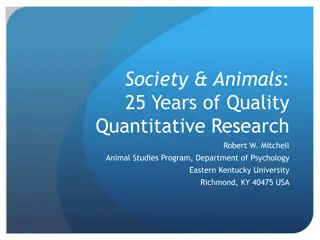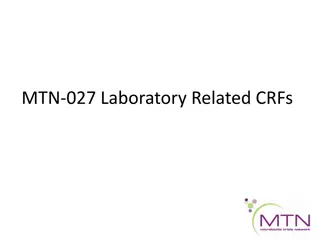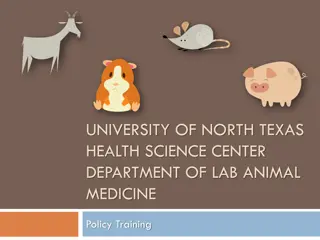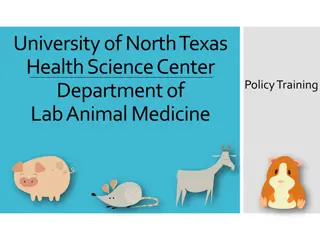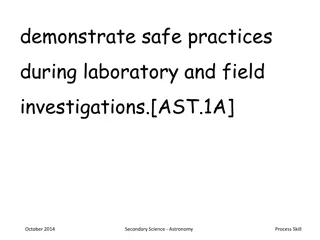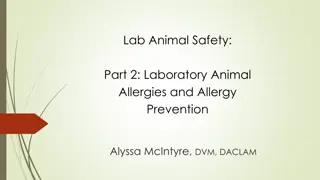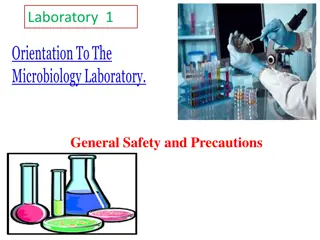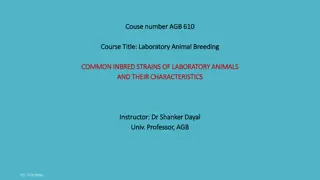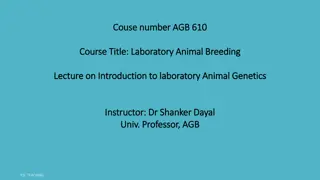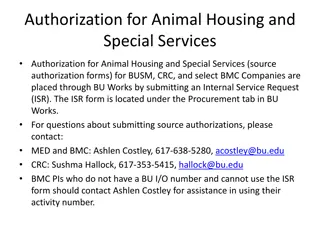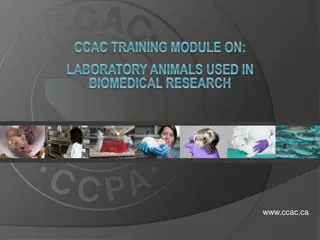History and Educational Programs of DEU Lab Animal Science Department
Established in 2004, the Department of Laboratory Animal Science at Dokuz Eylul University Institute of Health Sciences offers cutting-edge education focusing on animal welfare and ethical practices in scientific research. The department upholds the 3R Principle—Reduction, Refinement, Replacement�
0 views • 9 slides
Responsibilities of Facility Animal Care Committee at McGill University
The Facility Animal Care Committee (FACC) at McGill University oversees animal activities, ensures ethical treatment of animals, and adheres to guidelines from organizations such as the Canadian Council on Animal Care (CCAC). Responsibilities include continual oversight of animals, approving care pr
1 views • 13 slides
B.Sc (Arts) Courses and Colleges List for Science Students
If you\u2019re a 12th-grade student exploring undergraduate options in the B.sc science stream, consider the following list of recommended courses and colleges\nThe list of courses and colleges for the Science stream:\n1. B.sc (CS)\nThe BSc Computer Science, or BSc CS, is a 3-year undergraduate prog
9 views • 5 slides
Feed Software Market is expected to reach $456.1 million by 2030
The growth of this market is attributed to the adoption of digital technologies and automation in the animal feed industry, the growing animal population, increasing demand for healthy animal-based food products, increasing animal health expenditure and pet insurance, and the growing need to reduce
0 views • 4 slides
Enhancing Laboratory Billing Services with MedKarma, A Comprehensive Guide
In the dynamic healthcare landscape, laboratory billing services play a crucial role in ensuring smooth financial operations for medical laboratories. Effective billing practices not only streamline revenue cycles but also enhance overall operational efficiency. MedKarma, a leading provider of labor
2 views • 7 slides
Animal Welfare and Ethics: Standards and Regulations in India
The content covers a wide range of topics related to animal welfare, ethics, and laws in India. It delves into the definition of animal welfare, the role of veterinarians, animal welfare organizations, regulations like the Prevention of Cruelty to Animals Act, and protection of wildlife, working ani
0 views • 15 slides
Principles of Animal Breeding: Introduction and Historical Perspective
This unit covers the introduction to animal breeding, the application of genetics principles in breeding, historical perspectives including the work of Robert Bakewell, and key events in animal breeding evolution. Topics include breeding systems, importance of animal breeding, and notable figures in
1 views • 12 slides
Animal Research Compliance and Reporting Overview
Tips to ensure compliance in animal research, reporting requirements, types of reportable incidents in 2020, animals involved, individuals responsible for issues, and institutional corrective actions taken. Understanding the cooperative process of reporting, corrective actions, and responsibilities
0 views • 21 slides
Laboratory Animal Breeding and Mutant Mouse Strains in Research
Laboratory Animal Breeding course AGB 610 covers the use of mice in research, highlighting their value, ease of handling, and diverse genetic mutants available. The course explores the popular mouse strains used by immunologists and oncologists, including athymic nude mice and mutants like dh and lp
0 views • 16 slides
Importance of Training in Animal Care and Use for Research
Training in animal care and use is essential to ensure humane and appropriate treatment of research animals, promote regulatory compliance, and uphold high standards of science and animal well-being. The presentation covers the necessity of training, goals including reviewing animal use and identify
0 views • 53 slides
Small Animal Restraints and Safe Handling Practices in Veterinary Technology
Importance of safe practice when working with small animals includes preventing harm, reducing injury, and minimizing stress. Proper animal handling methods and tools are crucial for the safety of both animals and handlers. Common methods of handling different species, demonstrating appropriate anim
1 views • 22 slides
Understanding the Difference: Animal Rights vs. Animal Welfare
Explore the nuanced distinction between animal rights and animal welfare, delving into the ethical considerations, philosophies, and advocacy efforts surrounding these concepts. Discover how animal rights proponents emphasize the equal rights of animals, while animal welfare focuses on humane treatm
0 views • 36 slides
Quality Assurance in Virology Laboratory
This chapter focuses on quality assurance in virology laboratory, covering topics such as quality control, documentation of test results, laboratory safety rules, and more. It explains the types of quality control, quality assurance cycle, and process areas of quality assurance in laboratory testing
3 views • 19 slides
Free Science Education Resources at Science Prof Online (SPO)
Science Prof Online (SPO) is a comprehensive science education website offering Virtual Science Classrooms, science-related PowerPoints, articles, and images for students, educators, and anyone interested in science. The site provides various educational resources, including practice test questions,
0 views • 16 slides
Role of Veterinarians in Animal Welfare
Veterinarians, especially with the increasing number of female professionals in the field, play a crucial role in promoting animal welfare through daily practices, advocacy, education, and research. They are involved in various sectors like biomedical, wildlife, and farm animal research, as well as
3 views • 10 slides
Exploring Animal Management and Sociology in Education
Discover the intersection of animal management and sociology in education through a comprehensive course structure that covers topics ranging from animal welfare and ethics to practical husbandry. Dive into the significance of animal care in the UK economy and learn about various career paths in thi
2 views • 19 slides
Laboratory Animal Facilities Record-keeping Guidelines
Guidelines for maintaining records in laboratory animal facilities include provisions for animal housing, staff records, health monitoring, and standard operating procedures. Compliance with CPCSEA regulations ensures ethical review procedures for animal research proposals. Focus is on providing a s
6 views • 11 slides
Guidelines for Recording Keeping in Laboratory Animal Facilities
The Committee for the Purpose of Control and Supervision of Experiments on Animals outlines the importance of maintaining detailed records in laboratory animal facilities to ensure the well-being and proper management of animals used in experiments. Records ranging from animal house plans, staff hea
4 views • 5 slides
Achieving Comparable Results in Laboratory Practice
Good laboratory practice necessitates minimal error in measurement to reflect a patient's biological condition accurately, ensuring comparable and reliable results regardless of testing location or method. Standardization, harmonization, and traceability play crucial roles in achieving uniformity an
0 views • 29 slides
Understanding Allergies to Animals and Living Organisms
Allergies to animals and living organisms are a result of specific immune processes triggered by allergenic substances like proteins and peptides. This allergic response can be caused by various animal proteins such as dog allergens Can f.1, Can f.2, and Can f.3, and cat allergen Fel d1. The represe
1 views • 10 slides
Shuttleworth College Animal Management Course Overview
Shuttleworth College offers an Animal Management course focusing on various aspects such as Animal Breeding, Welfare, Biology, Husbandry, Behavior, and more. The program includes practical and theoretical components with assessments and work experience opportunities. Students are guided by dedicated
0 views • 15 slides
Exploring Human-Animal Interactions through 25 Years of Quality Research
Delve into the interdisciplinary realm of human-animal interactions with a focus on social sciences and quantitative research. Discover key themes such as social psychology, therapy, animal welfare, and more. Explore attitudes and personality differences related to animal treatment, empathy, and bel
1 views • 26 slides
Insights into Hematology Laboratory Practice
This resource explores the potential role of hematologists in laboratory settings, discussing board certification, advantages, challenges, current training trends, and core curriculum lectures in hematology. It sheds light on the critical areas of laboratory training, emphasizing the importance of u
0 views • 9 slides
Laboratory Related CRFs for Pharmacokinetics Study
This collection encompasses various CRFs related to laboratory procedures in the context of Pharmacokinetics for a study. It includes forms for enrollment, specimen storage, safety laboratory results, and specific days for sample collection. The CRFs detail the storage, collection, and documentation
0 views • 14 slides
SASAS Strategic Plan Vision 2025 - Summary and Objectives
The SASAS Strategic Plan Vision 2025 aims to develop capacity in animal science to enhance animal production systems sustainably, promote welfare, job creation, and poverty alleviation. Informed by local, regional, and global imperatives, it aligns with the National Development Plan 2030, African Un
0 views • 11 slides
Comprehensive Guide to Setting Up a K-6 STEM Laboratory
In this STEM lab design project, elementary schools are provided with a comprehensive booklet to help them establish a K-6 STEM laboratory. The booklet comprises five parts - Introduction, Description of the Space, Tools & Materials, Safety, and Resources. It covers the essence of STEM education, th
0 views • 14 slides
Guidelines for Access and Safety in the University of North Texas Health Science Center Department of Lab Animal Medicine
Learn about the access protocol for keys and access cards at the University of North Texas Health Science Center Department of Lab Animal Medicine, including training requirements, staff availability, and laboratory apparel guidelines. Understand the importance of occupational health and safety prac
0 views • 34 slides
Guidelines and Policies for Lab Animal Facility Access and Management
The Department of Lab Animal Medicine at the University of North Texas Health Science Center outlines important policies and procedures for accessing and managing the lab animal facility. From training requirements to access protocols, this comprehensive guide emphasizes safety, security, and compli
0 views • 30 slides
Enhancing Science Education Through Laboratory Learning Activities
Explore the importance of laboratory learning activities (LLAs) in science education, focusing on contemporary science representation, inquiry skills, and conceptual learning. Discover the benefits of inquiry-based learning, teaching science inquiry skills, and incorporating more inquiry-based learn
0 views • 22 slides
Best Practices in Laboratory and Field Investigations for Secondary Science - Astronomy
This content covers various aspects of safe practices in laboratory and field investigations related to secondary science - Astronomy. It includes information on resource conservation, disposal/recycling of materials, understanding the limitations of science, scientific hypotheses, theories, disting
0 views • 16 slides
Understanding Laboratory Animal Allergies and Prevention
Laboratory animal allergies pose a significant occupational hazard, with around 2 million workers at risk. Exposure routes include inhalation, skin contact, and ingestion. Factors such as pre-existing allergies, intensity of exposure, and secondhand exposure influence the likelihood of developing al
0 views • 30 slides
Laboratory General Safety and Precautions
Microbiology involves the study of microorganisms such as bacteria, fungi, viruses, and parasites. It is crucial to maintain strict safety protocols in the laboratory to prevent contamination and ensure the well-being of individuals handling these potentially pathogenic organisms. Rules like wearing
0 views • 26 slides
Upgrading to TOPAZ Elements: Enhancing Animal Protocols, Orders, Census, and Billing
The Animal Resource Facility (ARF) and Office of Animal Care Compliance (OACC) are shifting to TOPAZ Elements, a comprehensive web-based system, to streamline management of animal protocols, orders, census, and billing. This upgrade aims to provide better oversight for PIs, enhance compliance with r
0 views • 8 slides
Laboratory Animal Breeding: Common Inbred Strains and Characteristics
This course, AGB 610, on Laboratory Animal Breeding covers common inbred strains of laboratory animals and their unique characteristics. Detailed information is provided on popular strains like C57BL/6, C3H, BALB/c, DBA/2, CBA, and more, highlighting their susceptibility to diseases, tumor incidence
0 views • 7 slides
Understanding Laboratory Animal Genetics and Research Importance
This course (AGB 610) delves into the realm of laboratory animal breeding, exploring the significance of using animals in research and teaching. Dr Shanker Dayal, a distinguished professor, guides students through lectures on animal genetics and the common uses of laboratory animals. The course emph
0 views • 14 slides
Understanding Animal Tissue Culture and Cell Line Production
Animal tissue culture involves growing tissues separate from the animal in a laboratory setting. To achieve exponential cell growth, cells are converted into immortal cell lines. The production of a cell line involves steps like breaking cell adhesion, incubation, and transferring cells to fresh med
0 views • 22 slides
Authorization for Animal Housing and Special Services Process Guidelines
The guidelines outline the process for authorizing animal housing and special services at BUSM, CRC, and select BMC Companies through BU Works via Internal Service Requests (ISR). Investigators must submit ISR forms for animal housing at the Animal Science Center, monitor charges, and provide advanc
0 views • 8 slides
Training Module on Laboratory Animals in Biomedical Research
This training module focuses on the utilization of laboratory animals in biomedical research, covering various species such as rodents, rabbits, birds, amphibians, and more. It emphasizes understanding different animal models, controlling experimental variables, and outlining responsibilities within
0 views • 34 slides
Exploring the Role and Objectives of Laboratory Teaching
The content delves into the various perspectives on laboratory teaching, its aims, pedagogical levels, and common challenges faced. It discusses specific aims of laboratory teaching, including familiarization with equipment, teaching experimental work attitudes, and training in observation and deduc
0 views • 32 slides
Guidelines for Nomenclature of Laboratory Mouse and Rat Strains
Laboratory mice and rat strains have specific nomenclature guidelines to account for their genetic backgrounds and origins. Mouse strains are registered through the Mouse Genome Database, while rat strains are registered through the Rat Genome Database. The use of Laboratory Registration Codes is cr
0 views • 14 slides



